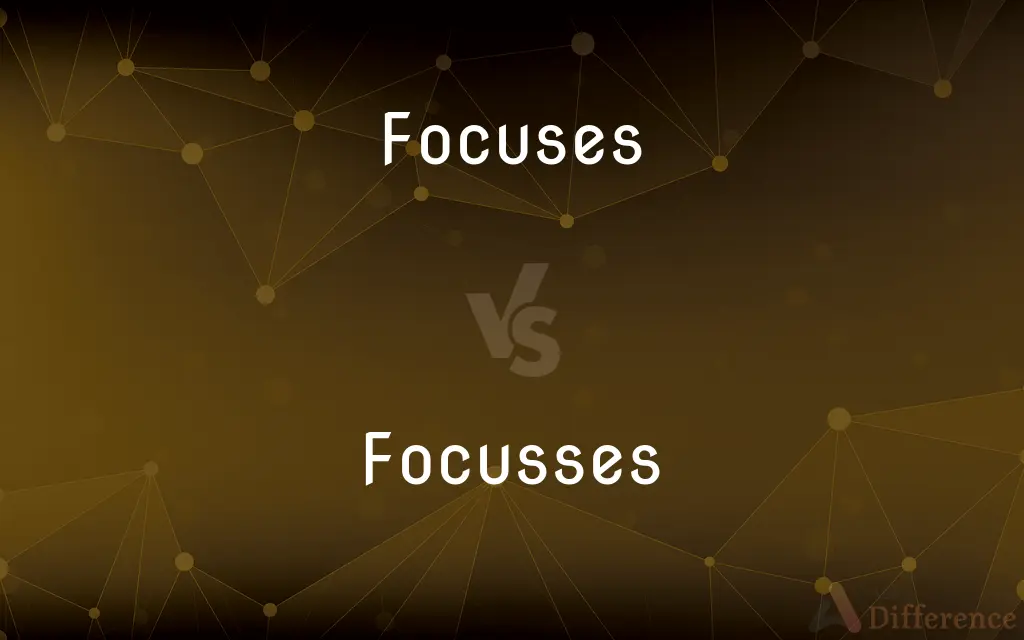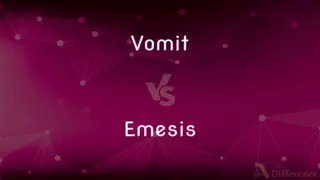Focuses vs. Focusses — What's the Difference?
By Tayyaba Rehman & Urooj Arif — Updated on April 15, 2024
"Focuses" is the preferred spelling for the plural of "focus" in American English, emphasizing clarity and simplicity, while "focusses" is a less common variant often used in British English.

Difference Between Focuses and Focusses
Table of Contents
ADVERTISEMENT
Key Differences
"Focuses" is commonly used in American English to denote multiple points of concentration or the plural form of the noun 'focus', while "focusses" is an alternative spelling that appears primarily in British English contexts. Both versions are correct, but their usage varies geographically.
In terms of verb usage, "focuses" is the third person singular present tense of "focus," used as in "She focuses on her work," whereas "focusses" can serve the same function but might appear stylistically dated or regionally specific in British English.
When discussing the past tense of the verb "to focus," "focused" is universally accepted over "focussed" in American English, highlighting a preference for simpler spelling conventions, while British English might use "focussed" more frequently.
In educational and professional writing in the United States, "focuses" is overwhelmingly the standard form used, whereas "focusses" might occasionally appear in British academic papers or literary texts.
In digital communication and global business, "focuses" is more widely recognized and understood, reinforcing simplicity and consistency in international contexts, unlike "focusses," which might cause confusion or be seen as a typographical error.
ADVERTISEMENT
Comparison Chart
Geographic Usage
Preferred in American English
Often used in British English
Commonality
More common and standard
Less common, can appear dated
Verb Form Usage
"She focuses on her studies."
"He focusses on his studies."
Past Tense
"Focused" is standard
"Focussed" sometimes used
Perception
Viewed as modern and standard
May be seen as old-fashioned
Compare with Definitions
Focuses
Commonly accepted form in modern American English.
The manual focuses on safety precautions.
Focusses
Concentrates on a task, British usage.
He focusses on completing the project.
Focuses
Points of concentration.
The photographer adjusts her camera to capture the different focuses in the landscape.
Focusses
Older or traditional form in British English.
The document focusses on historical analysis.
Focuses
Used for clear communication in professional settings.
The teacher focuses each lesson on a key topic.
Focusses
Alternative spelling for points of concentration.
His research focusses on urban development.
Focuses
Concentrates on a task.
She focuses intently on her homework.
Focusses
Directs attention or effort, less common form.
She focusses her efforts on fundraising.
Focuses
Directs attention or effort.
He focuses on improving his language skills.
Focusses
May be viewed as traditional or formal in some contexts.
The proposal focusses on the foundational theories.
Focuses
An apparatus used to adjust the focal length of an optical system in order to make an image distinct or clear
A camera with automatic focus.
Focusses
The distinctness or clarity of an image rendered by an optical system.
Focuses
The distinctness or clarity of an image rendered by an optical system.
Focusses
The state of maximum distinctness or clarity of such an image
In focus.
Out of focus.
Focuses
The state of maximum distinctness or clarity of such an image
In focus.
Out of focus.
Focusses
An apparatus used to adjust the focal length of an optical system in order to make an image distinct or clear
A camera with automatic focus.
Focuses
A point at which rays of light or other radiation converge or from which they appear to diverge, as after refraction or reflection in an optical system
The focus of a lens. Also called focal point.
Focusses
A point at which rays of light or other radiation converge or from which they appear to diverge, as after refraction or reflection in an optical system
The focus of a lens. Also called focal point.
Focuses
See focal length.
Focusses
See focal length.
Focuses
A center of interest or activity
"Precisely how diet affects E. coli in livestock is the focus of current research" (Cindy Engel).
Focusses
A center of interest or activity
"Precisely how diet affects E. coli in livestock is the focus of current research" (Cindy Engel).
Focuses
Close or narrow attention; concentration
"He was forever taken aback by [New York's] pervasive atmosphere of purposefulness—the tight focus of its drivers, the brisk intensity of its pedestrians" (Anne Tyler).
Focusses
Close or narrow attention; concentration
"He was forever taken aback by [New York's] pervasive atmosphere of purposefulness—the tight focus of its drivers, the brisk intensity of its pedestrians" (Anne Tyler).
Focuses
A condition in which something can be clearly apprehended or perceived
Couldn't get the problem into focus.
Focusses
A condition in which something can be clearly apprehended or perceived
Couldn't get the problem into focus.
Focuses
(Medicine) The region of a localized bodily infection or disease.
Focusses
(Medicine) The region of a localized bodily infection or disease.
Focuses
(Geology) The point of origin of an earthquake.
Focusses
(Geology) The point of origin of an earthquake.
Focuses
(Mathematics) A fixed point whose relationship with a directrix determines a conic section.
Focusses
(Mathematics) A fixed point whose relationship with a directrix determines a conic section.
Focuses
To cause (light rays, for example) to converge on or toward a central point; concentrate.
Focusses
To cause (light rays, for example) to converge on or toward a central point; concentrate.
Focuses
To render (an object or image) in clear outline or sharp detail by adjustment of one's vision or an optical device; bring into focus.
Focusses
To render (an object or image) in clear outline or sharp detail by adjustment of one's vision or an optical device; bring into focus.
Focuses
To adjust (a lens, for example) to produce a clear image.
Focusses
To adjust (a lens, for example) to produce a clear image.
Focuses
To direct toward a particular point or purpose
Focused all their attention on finding a solution to the problem.
Focusses
To direct toward a particular point or purpose
Focused all their attention on finding a solution to the problem.
Focuses
To converge on or toward a central point of focus; be focused.
Focusses
To converge on or toward a central point of focus; be focused.
Focuses
To adjust one's vision or an optical device so as to render a clear, distinct image.
Focusses
To adjust one's vision or an optical device so as to render a clear, distinct image.
Focuses
To concentrate attention or energy
A campaign that focused on economic issues.
Focusses
To concentrate attention or energy
A campaign that focused on economic issues.
Focuses
Plural of focus
Focusses
(British) focus
Focusses
(British) focus
Common Curiosities
Which spelling should be used in academic writing?
"Focuses" is generally recommended, especially if following American English guidelines.
Is there a difference in meaning between "focuses" and "focusses"?
No, there is no difference in meaning; the difference is in regional spelling preferences.
Can "focusses" be used in professional writing?
Yes, "focusses" can be used, particularly in British English, though it is less common.
What is the most common spelling of the plural form of 'focus'?
"Focuses" is the most common spelling, especially in American English.
Are both "focuses" and "focusses" accepted in English dictionaries?
Yes, both spellings are accepted, with "focuses" being the standard form in American dictionaries.
How does the usage of "focuses" and "focusses" differ in digital communication?
"Focuses" is more widely recognized and preferred in digital communication for clarity and simplicity.
Are there specific regions in the UK where "focusses" is more prevalent?
"Focusses" might be more commonly seen in academic or older texts, rather than specific regions.
Can the choice of spelling impact the tone of a document?
Yes, using "focusses" may give a document a more formal or traditional British tone.
Does the choice between "focuses" and "focusses" affect readability?
Yes, "focuses" is typically more familiar to readers, particularly in international and American contexts.
What is the recommended spelling for multinational corporations?
Multinational corporations generally use "focuses" to maintain consistency in global communication.
Is "focussed" acceptable in past tense usage globally?
While acceptable, "focused" is preferred globally, especially in American and international English.
How do spell-checkers typically handle "focusses"?
Spell-checkers programmed for American English may flag "focusses" as incorrect, preferring "focuses."
How should non-native English speakers decide which form to use?
Non-native speakers should generally use "focuses," especially if communicating in an international or American context.
What advice is given to students learning English regarding these spellings?
Students are advised to use "focuses," as it is the more commonly taught and recognized form.
What should writers consider when choosing between "focuses" and "focusses"?
Writers should consider their audience and the conventional spelling practices of their readers’ region.
Share Your Discovery

Previous Comparison
Vomit vs. Emesis
Next Comparison
Damaged vs. DefectiveAuthor Spotlight
Written by
Tayyaba RehmanTayyaba Rehman is a distinguished writer, currently serving as a primary contributor to askdifference.com. As a researcher in semantics and etymology, Tayyaba's passion for the complexity of languages and their distinctions has found a perfect home on the platform. Tayyaba delves into the intricacies of language, distinguishing between commonly confused words and phrases, thereby providing clarity for readers worldwide.
Co-written by
Urooj ArifUrooj is a skilled content writer at Ask Difference, known for her exceptional ability to simplify complex topics into engaging and informative content. With a passion for research and a flair for clear, concise writing, she consistently delivers articles that resonate with our diverse audience.













































